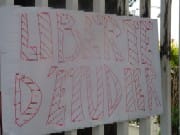500 students are in front of the law faculty at Nice. With banners and discussions, they protest against the blocking of the faculty. At the request of the UNEF union, the first general assembly on the campus is due to take place at 12:30 PM. “We don’t want UNEF, which has no right here, to impose a blockade. Outsiders are going to try to interfere in the amphitheater. We want to remain sovereign,” explains Céline, a master’s student in public law.
The tension is palpable. Gathered in front of the campus entrance, they fear the arrival of students from the faculty of letters. For the future jurists, who respect the right to study, and even though opinions are divided concerning the First Employment Contract (CPE), it is unacceptable to be denied access to amphitheaters and classrooms. This is one of the reasons why no assembly had taken place since the beginning of the anti-CPE movement. “If we don’t agree, we will demonstrate, but let’s not touch the freedom to study, which is a fundamental right,” summarizes Julien.
As the time for the general assembly approaches and the fear of being overrun grows, there is an exaggeration and circulation of false rumors. Amphitheater 1 is about to experience one of the strongest oppositions to the anti-CPE movement. Students gather in front of the entrance, armed with their student ID cards. Strict checks are required to enter the general assembly. One by one, the seats fill up. The filtering is rigorous. The amphitheater only has 150 seats. It is too small to accommodate everyone, and only the staunch opponents to the anti-CPE movement will enter.
The room fills up slowly. As it nears full capacity, members of the anti-CPE collective choose this moment to burst in. Scuffles. Insults. Even some slaps. Their intrusion through a back door is not to the liking of the law students, who thought they had done everything to prevent this from happening. The platform of law students gives the floor to a representative from UNEF, the student union. She outlines the reasons for her presence, emphasizing her willingness to debate and her right to speak. Boos and taunts: law students have no desire to debate the pros and cons of the blockade. They are categorically opposed to the blockade as it is illegal. Since dialogue is impossible, UNEF-affiliated students retreat. The law faculty at Nice will likely never be blocked.
The AG continues for a few minutes in chaos. The pseudo debate remains sterile. The wait, the anxieties, and the anger at the invasion have exacerbated the future jurists. Words more for assault than defense.
Once the amphitheater is evacuated, the atmosphere calms down, and the students regain their serenity. Sébastien Bonfils, one of the representatives of the law students, analyzes: “We were caught off guard. We did not want this general assembly, and it was imposed on us. We were afraid that 100 pro-blockade students would vote to block our faculty while a vast majority of us want to continue with classes. We don’t need a vote to show it. Just look at the number of students who stood at the entrance to prevent access to outsiders. And if we have to vote, we will vote, but not in an AG. We will set up ballot boxes. We’ll leave them for a few days so that everyone can vote, and we will ensure that only law students cast their ballots.”
The future jurists have a reputation for being calm, poised, and thoughtful, but when someone dares to touch the freedom to study, they become furious. They defend themselves and attack without pleading. Intransigence prevails: it is out of the question for them to be imposed with the blockade.


